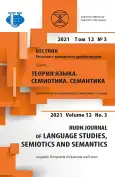“Ethical Evaluation” as a Tactics of Delegitimization Strategy in the Pre-Election Discourse
- Autores: Kameneva V.A.1, Rabkina N.V.1
-
Afiliações:
- Kemerovo State University
- Edição: Volume 12, Nº 3 (2021): Linguistic dominants of grammar and lexics
- Páginas: 743-757
- Seção: DISCOURSIVE PRACTICES AND TEXT ANALYSIS
- URL: https://journal-vniispk.ru/2313-2299/article/view/323363
- DOI: https://doi.org/10.22363/2313-2299-2021-12-3-743-757
- ID: 323363
Citar
Texto integral
Resumo
The present study is based on such relevant areas of modern linguistics as Political linguistics and Linguistic personology. It included//includes samples of 30 speeches given by US President Joe Biden during his 2020 election campaign. A review of related scientific publications showed almost no detailed works on linguistic means connected with tactics that brings about delegitimization strategy; nor is there any unified term for a strategy of creating a negative image of a political rival in the election discourse. The authors believe that, in the election discourse, the abovementioned strategy aims at destroying the credibility of the political opponent and the solutions they have to offer beyond questioning their legality. Therefore, the tactics of ethical evaluation can be an effective means to destroy the credibility of a political oppo nent by using words of evaluative connotation. The tactics makes it possible to explicate a direct or contextual negative attitude to an opponent. Joe Biden’s ethical evaluation of Donald Trump appeared to have three axiological aspects. The research used the theoretical and methodological apparatus of Political linguistics and Linguistic personology, e.g. such methods as content analysis, lexical-semantic analysis, and intent analysis. The paper introduces an analysis of lexemes that verbalize the tactics of ethical evaluation, which showed predominance of words and idioms of an unambiguous negative evaluative connotation. The authors also detected the absence of any abusive language that could be interpreted as a direct insult or accusation. The results can be used for a critical analysis of the political discourse of individual politicians.
Palavras-chave
Sobre autores
Veronika Kameneva
Kemerovo State University
Autor responsável pela correspondência
Email: russia_science@mail.ru
ORCID ID: 0000-0001-8146-9721
Doctor of Philology, Professor, Professor of the Department of Romanic-Germanic Philology
6, Krasnaya St., Kemerovo, Russian Federation, 650000Nadezda Rabkina
Kemerovo State University
Email: nrabkina@mail.ru
ORCID ID: 0000-0002-6623-6679
Candidate of Philology, Assistant Professor at the Department of Translation Studies and Linguistics
6, Krasnaya St., Kemerovo, Russian Federation, 650000Bibliografia
- Tymbaj, A.A. (2018). Communicative strategies of American politicians (basing on the 2016 election campaign). RUDN Journal of Language Studies, Semiotics and Semantics, 9(1), 105—123. doi: 10.22363/2313-2299-2018-9-1-105-123 (In Russ.).
- Golubeva, T.M. (2016). Linguistic parameters of the strategy of legitimizing the European Union and delegitimizing B. Al-Assad in the British political discourse. Izvestiya of Saratov University. Philology. Journalism, 16(4), 392—396. doi: 10.18500/1817-7115-2016-16-4-392-396 (In Russ.).
- Gornostaeva, A.A. (2018). The pre-election political discourse in the USA 2016 and Russia 2018: comparative analysis. Bulletin of the Moscow Region State University (electronic journal), 3, 228—239. (In Russ.).
- Kameneva, V.A. (2019). Evaluation metaphors of pre-election discourse (linguo-personological approach). Vestnik Chelyabinskogo Gosudarstvennogo Unviersiteta, 6(428), 63—70. (In Russ.).
- Kononova, I.V. & Melnichuk, T.A. (2020). Evaluation category dynamics in the discourse of American election commercials. Сognitive studies of language, 2(41), 836—840. (In Russ.).
- Novoselova, O.V. (2019). Implicit menasives of the Russian election discourse. World of Linguistics and Communication, 58, 153—168. (In Russ.).
- Romanov, A.A. & Novoselova, O.V. (2020). Discoursive realization of threat in pre-election communication. Russian Journal of Linguistics, 24(2), 419—448. doi: 10.22363/2687-0088-2020-24-2-419-448 (In Russ.).
- Ruzhentseva, N.B. (2018). Political and communicative strategies in print pre-election publications of 2018. Political Linguistics, 2(68), 18—28. (In Russ.).
- Tarmaeva, V.I. (2020). Sports vocabulary in the election text: cognitive-pragmatic aspect. Bulletin of the Cherepovets State University, 5(98), 97—108. (In Russ.).
- Nazarova, R.Z. & Zolotarev, M.V. (2018). Verbal tactics of persuasion in contemporary Russian Electoral discourse (the study of the presidential campaign of 2017—2018). Izvestiya of Saratov University, Sociology, Politology, 18(4), 394—399. doi: 10.18500/1818-9601-2018-18-4-394-399 (In Russ.).
- Barebina, N.S. & Kosyakov, V.F. (2018). The rationality and rhetoric of the pre-election discourse (based on the material of the US election debates in 2016). Ekologia Yazyka I Kommunikativnaya Praktika, 1(12), 28—43. (In Russ.).
- Dmitrieva, M.I. & Dubrovskaya, V.V. (2020). Manipulative Communicative Strategies (by the Example of 2016 Presidential Election Campaign in the USA). Philology. Theory & Practice, 13(7), 180—184. doi: 10.30853/filnauki.2020.7.34 (In Russ.).
- Kopacheva, A.R. (2019). Peculiarities of emmanuel macron’s pre-election political discourse. Professionalniy Proekt: idei, tekhnologii, rezultaty, 3(36), 41—46. (In Russ.).
- Sergeeva, D.S. (2017). Self-presentation and discrediting are key strategies of the pre-election political discourse (based on the pre-election tweets of D. Trump and H. Clinton). Novosti Juzhnogo Federalnogo Universiteta. Filologicheskiye Nauki, 3, 75—83. (In Russ.).
- Sergeeva, N.A. (2019). Strategies and tactics of speech influence in B. Obama’s pre-election discourse. Vestnik Sovremennykh Issledovaniy. 1.6(28), 310—316. (In Russ.).
- Khabekirova, Z.S. (2011). The strategy of discrediting and methods of its implementation in the political discourse of the democratic opposition. Vestnik Adygeyskogo Gosudarstvennogo Unviersiteta Filologia i Istoria Iskusstva, 3, 138—144. (In Russ.).
- Khlopotunov, Ya.Yu. (2017). Speech tactics of discrediting in the American pre-election discourse. Voрrosy Prikladnoy Lingvistiki, 27, 77—86. (In Russ.).
- Gumuscu, S. (2013). The Emerging Predominant Party System in Turkey. Government and Opposition, 48(2), 223—244.
- Khajavi, Y., Khajavi, Y. & Rasti, A. (2020). A discourse analytic investigation into politicians’ use of rhetorical and persuasive strategies: The case of US election speeches. Cogent Arts & Humanities, 7(1), 1740051. doi: 10.1080/23311983.2020.1740051
- Leeuwen, van T. (2013). Legitimation in Discourse and Communication. In Critical Discourse Analysis: Concepts, History, Theory, 1, 327—350.
- Sadeghi, B. (2014). Towards (de-) legitimation discursive strategies in news coverage of Egyptian protest: VOA & Fars news in focus. Procedia-Social and Behavioral Sciences, 98, 1580—1589.
- Golubeva, T.M. (2017). Linguistic and rhetorical parameters of the delegitimization of Russia and the legitimization of the United States in the speech of American representatives to the UN. Izvestiya of Saratov University, Philology. Journalism, 17(4), 383—388. doi: 10.18500/1817-7115-2017-17-4-383-388 (In Russ.).
Arquivos suplementares









